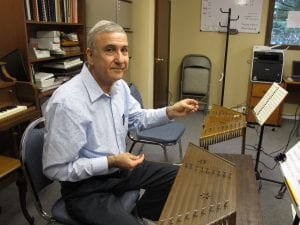Emily Hartlerode
Watching Hossein Salehi teach his apprentice, Alireza, over Zoom last weekend was inspiring and uplifting. In addition to the technology, they brought their instruments, a music book, and their passion for progress. Alireza performed three well rehearsed pieces for Hossein who, after each one, gave feedback about what he had done correctly, then offered advanced training for improvement. After addressing these pieces, Hossein requested Alireza try the next piece in the book. Displaying impressive sight reading skills, Alireza performed the piece once in “simple form” and again, after Hossein gave brief comments, with ornamentation. Hossein ended with a theory lesson on the math of triplet notes and a demonstration of how to perform them. Alireza performed the technique back for Hossein, who gave final feedback before the lesson concluded.
I’ve known Hossein Salehi to be an incredible master artist, but this was the first I watched him conduct a lesson. I complimented Hossein on his teaching method, which is both motivating and instructive. Hossein referenced his experiences learning as a youngster under very different learning conditions that may be familiar to many of us. In that model, teachers are authorities, assumed to be brilliant and capable, so students who fail to understand the knowledge they try to share are assumed to have something wrong with them. Such students frequently leave with false belief about themselves: like they are not bright, bad at math, or have no creativity. Hossein recognized in highschool that he was able to break down concepts in math and chemistry that his friends could understand easier than his teachers’ lessons. His friends made repeat requests for him at breaks and after class to teach them what their own teacher had been unable to communicate. Hossein learned early in life the value of being able to break down complex ideas into small, manageable pieces. About his encouraging, affirmative style of focusing on his students’ success, Hossein referenced a lesson from his aviation training in a class on Methods of Instruction: students are far better motivated by a positive response than a negative one.
What struck me most was watching the grace and skill of a master teacher, a testimony to Hossein’s technology skills to make the interface invisible, and to Alireza’s hunger to learn, which forgave any inconvenience he felt by the social-distancing approach. Attending Hossein’s virtual lesson and seeing Alireza progress was a pleasure that affirmed OFN’s selection of this Traditional Arts Apprenticeship Program team. Thanks to all our master artists and apprentices who continue working hard, despite coronavirus and so many challenges to keeping culture vibrant. We applaud you!
